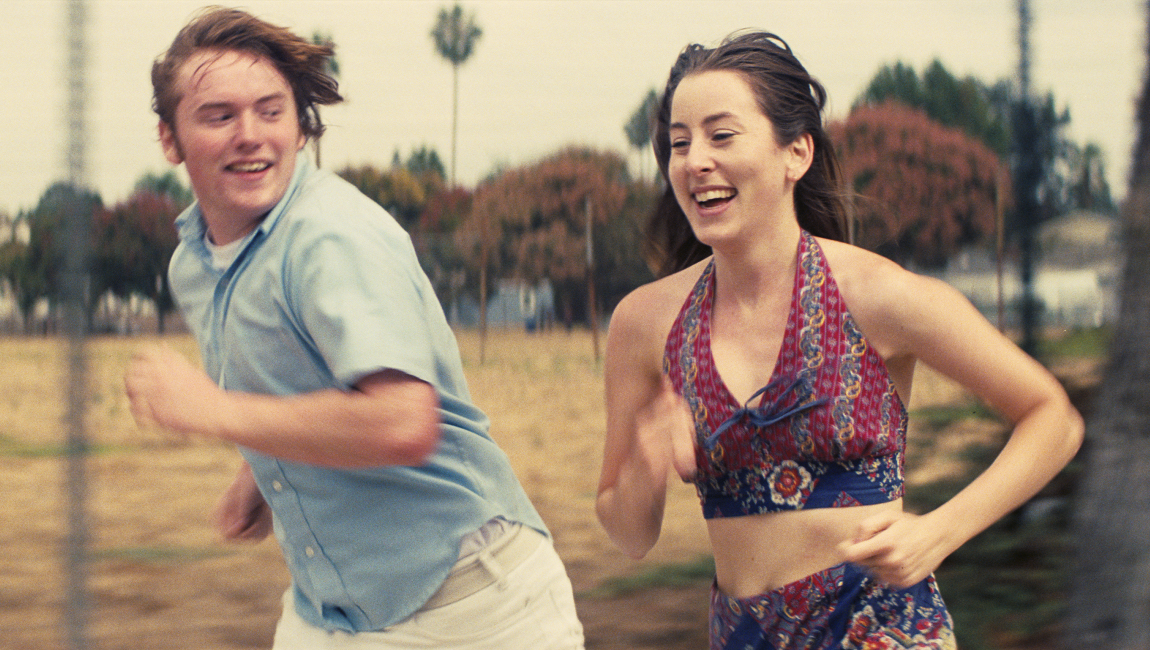Jared Moshé’s Aporia is a rare thing indeed: a high-concept, hard sci-fi head-scratcher that still feels human-scaled thanks to sensitive performances and focus on familial dynamics over mere hardware. The film boasts a compelling setup: Sophie (Judy Greer, magnetic in a rare starring role) is a recently widowed mother suffocating under mountains of stress. Her deceased husband Mal (Edi Gathegi) was the emotional fulcrum that maintained the family’s stability — since his passing, their teenage daughter Riley (Faithe Herman) has started acting out at school and refuses to socialize with friends. Sophie’s day job is extremely demanding, and the drunk driver that killed Mal is walking around free on bail while a trial date keeps getting pushed back.
The film opens with Riley being suspended from school and Sophie having to call a neighbor, Jabir (Payman Maadi), to pick her up. Jabir and Mal were friends and also scientists whose chosen careers were cut short, although Jabir tries to help out when he can. Witnessing Sophie’s dire circumstances firsthand, he decides to reveal a monumental secret — before Mal’s death, the two scientists had created a kind of time machine. It can’t send a person anywhere, but it can send an energy burst into the recent past and kill one person. Jabir’s reasoning is very simple: if they kill the drunk driver that hit Mal before the accident ever occurs, Mal won’t die and Sophie’s life will return to normal. Sophie is, of course, taken aback by the suggestion that she should murder anyone, but the idea nags at her. She eventually capitulates, thanks to grief and anger, and gives Jabir her blessing to use the machine. It works, and Mal returns as if nothing ever happened. It’s a big bold hook on which to hang a movie, flush with wide-ranging moral and ethical implications, which writer-director Moshé takes pains to explore. Naturally, there are unforeseen complications to this initial decision, and now that a sort of Pandora’s box has been opened, Sophie, Mal, and Jabir must decide how, or if, to use the machine.
There are a few obvious antecedents here: Richard Matheson’s short story Button, Button, Richard Kelly’s filmed adaptation The Box, and Ray Bradbury’s A Sound of Thunder all spring immediately to mind. Like any good time travel (or time travel-adjacent) movie, Aporia carefully explains its ground rules, mostly so that audiences can anticipate what will eventually go wrong. In Moshé’s conception of this peculiar time paradox, anyone in the room with the machine when it is used will remember everything that happened in the interim, while things outside of the room will inevitably change. In other words, Jabir and Sophie are “constants,” observers and keepers of various alternate realities that only they remember. This leads to some confusion, since the resurrected Mal has no idea that he was ever gone, or why Sophie is so emotional when she lays eyes on him. There’s also a bit of gallows humor, as the three characters must navigate changes to whatever reality they emerge into. This means Riley also has no idea about the other timeline where her father was dead for six months; she is still the science-loving youngster who does math and looks through telescopes with dear old dad.
Things begin to get complicated when Sophie decides to look in on the widow of the drunk driver that she (for all practical purposes) assassinated. Sophie assumes that he was abusive, but is startled to realize that the man barely ever drank, and that his wife dearly misses him. In another wrinkle, the woman has a daughter afflicted with a degenerative disease and little means to afford the medical care necessary to treat her. Sophie is wracked with guilt, while Jabir reminds her that thanks to him, she has Mal back. For his part, Jabir dreams of stopping school shootings and terrorist attacks, while Sophie and Mal are reluctant to use the machine at all. The trio decide that if they are in fact going to use the machine again, they have to think through every possible ripple effect that a change to the past might cause in their present.
To describe more of the plot would be unfair to viewers; Aporia isn’t a film based on big twists, but there are some surprises in store for our intrepid timeline explorers. The narrative proceeds with a careful attention to detail and a kind of inexorable internal logic, one decision leading to another and then another as consequences pile up. Moshé doesn’t dip his toes into notions of “fate,” but instead relies on a more materialist notion of concrete cause and effect. It all builds to a thrillingly opaque ending, seemingly engineered to make audiences leave the theater with different interpretations as to what it all means. It’s a bold gambit that has torpedoed many films before, but Aporia thankfully earns it.
Published as part of Fantasia Fest 2023 — Dispatch 3.







